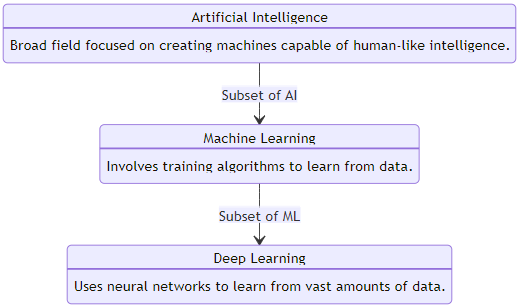Overview of Machine Learning
Welcome to the world of Machine Learning (ML)! This page is designed to introduce you to the fascinating field of ML, which is a branch of artificial intelligence (AI) focused on building systems that learn from data. As a beginner, you might wonder what machine learning really is and why it's so important. Let's dive in!
1.1 What is Machine Learning?
Machine Learning is a method of data analysis that automates analytical model building. It is a branch of artificial intelligence based on the idea that well-defined systems can learn from data, identify patterns, and make decisions with minimal human intervention.
Key Concepts:
Algorithm: A set of rules or instructions given to an AI system to help it learn on its own.
Data: The raw information from which machines learn and patterns are identified.
In traditional programming, we input rules (algorithms) and data to get answers. In machine learning, we input data and answers (labels) to discover the rules.
AI vs. ML vs. Deep Learning
Machine learning, artificial intelligence, and deep learning are distinct terms that are often used interchangeably. Artificial Intelligence (AI) is a broad field focused on creating smart machines capable of performing tasks that typically require human intelligence; Machine Learning (ML) is a subset of AI that involves training algorithms to learn from and make predictions or decisions based on data; and Deep Learning (DL) is a subset of ML that uses neural networks with many layers to learn from vast amounts of data.

1.2 Applications of Machine Learning
Machine Learning is not just a buzzword but a reality in today's world. It is used in various sectors, such as:
Healthcare: Predictive diagnostics, personalized treatment, and drug discovery.
Finance: Fraud detection, algorithmic trading, and risk assessment.
Retail: Personalized shopping, inventory management, and demand forecasting.
1.3 Importance of Machine Learning
The importance of ML lies in its ability to process large volumes of data and make accurate predictions or decisions based on that data. It helps in:
Making better and faster decisions.
Uncovering hidden insights in data.
Automating repetitive tasks.
Conclusion
This overview is just the tip of the iceberg in understanding machine learning. The next section will further illustrate the real-world impact of ML across various industries through case studies, demonstrating its vast potential and importance.